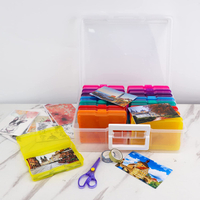7 items you should never store in the attic – and they might surprise you
Think twice before you store your favorite sentimental items in your attic


For many households, the attic is a useful spot for stashing away holiday decorations and seasonal clothes. We store all sorts up there out the way, freeing up storage space in our living rooms and bedrooms.
And we do so without giving it a lot of thought, be it family photographs or camping gear. However, experts point out that the conditions of our attics need to be carefully controlled if we want to avoid damaging our treasured belongings.
Here are the things you ideally wouldn't store in the attic, according to professional home organizers.
What not to put in the attic
The attic needs to be well-insulated and well-ventilated, especially when keeping items of value in there. Given the potential issues that can arise, like humidity, pests (getting rid of squirrels in the attic being a common issue), dust, and fluctuating temperatures, it's advisable to wrap your belongings up thoroughly and store them in sealed containers
1. Books

Tim Jankowski, President of Aladdin's Cleaning & Restoration, says we shouldn't be using our attics for book storage. 'Attics are notorious for growing mold,' comments Tim.
'Because they are typically dark and not often accessed, they can be a breeding ground for different mold strains. I would keep books out of attics,' Tim says.
He recommends keeping the attic well-ventilated to help prevent mold and mildew from ruining anything you might decide to store in your attic. If there's been a leak or high humidity levels, using one of the best dehumidifiers will help to get rid of mold up there.
2. Artwork

The attic might seem like a good place to store artwork away while renovating, but Tim Jankowski says otherwise, again due to the risk of mold in an attic. All the more reason to get those prints off the floor and up onto the walls ASAP when decorating with artwork.
3. Medication

Because of the potentially humid conditions and variations in temperature, Tim also warns against storing medication of any kind in the attic. What's more, after a lengthy period of time, old, expired medications may become one of the toxic items in your attic. If you're running out of space, there are plenty of smart ways to organize a medicine cabinet that might work for you.
4. Leather

Eryn Donaldson is a professional organizer from The Model Home, and she says leather should absolutely not be stored in the attic. 'It doesn't do well in humid climates — this is why you rarely see leather couches and things in Florida decor or humid locations,' she says.
'Attics tend to be more humid than most spaces in the home,' Eryn continues. 'Heat rises! The temperature changes so much in an attic so I would not recommend storing leather clothing items or furniture in an attic.'

Eryn is the CEO and Founder of The Model Home, an Organizational Company with teams in the DC metro area and LA specializing in the unpacking/packing, decluttering, and organizing of all spaces including homes, garages, offices, and basements.
5. Clothes

Aaron Traub from My Professional Organizer Dallas says that on a recent job his team worked on, they some issues organizing and decluttering an attic for a client.
He argues that the attic is not suitable for clothes storage, as textiles are sensitive to temperature changes. 'The attic can get extremely hot in the summer and cold in the winter, which can cause fabrics to shrink, fade, and develop mold. Additionally, clothes can attract pests such as moths and silverfish.'
6. Photos

Controversially, experts say that photos aren't best suited to the attic either. 'You never want to store photos in a high-heat or humid environment,' warns Eryn. 'If your attic is humid, I would avoid this so that you do not ruin the photos!'
If you have lots of photo albums in your living space, consider scaling down your collection or trying out new living room storage ideas to keep things streamlined.
UNMAIO 4"x6" Photo Cases and Clear Craft Keeper with Handle - 16 Inner Cases Plastic Storage Container Box | $24.99 at Amazon
If you can't part with family photos, this storage case with 16 inner cases is a good solution as each inner case snaps tight shut, keeping photo memories safe. Use a label maker to help organize photos from different vacations and occasions.
7. Wool
Why? Bugs and animals are attracted to them and will make homes in your wool clothing, rugs and blankets. For example, carpet beetles feed on natural fibers like wool (as well as dead skin cells), and leave holes in their wake.
Is it safe to store cardboard boxes in the attic?
'Cardboard is a porous material that can absorb moisture from the air, which can cause it to become weak and eventually collapse,' says professional organizer Aaron Traub. He recommends using plastic bins with airtight lids, available at Amazon, instead.
'We recently worked with a client to pack up all of the items stored in their attic for years. Unfortunately, many of the items needed to be trashed. Our client had used cardboard boxes to store their items, resulting in mold and boxes chewed through by mice,' he shares.
Eryn Donaldson also cautions against storing cardboard in the attic because it makes the perfect home for critters. 'Avoid, avoid, avoid!'
Do clothes get ruined in the attic?
Clothes can get ruined in an attic because of the change of temperatures, humidity, and bugs! If you are going to store clothing in an attic- make sure that is an attic that does not change drastically in temperature.
I would suggest storing them in an airtight container, trunk or using garment bags, at Amazon. If the clothing is vintage or delicate, I would suggest garment bags so that they can breathe and not be compressed in a trunk or container. IF the items are seasonal( like storing winter clothes or summer clothes that you will take down each year, storing them in a trunk or airtight container is just fine.
What are the best items to store in the attic?
'Tarps and tents are generally fine in an attic. Gardening tools and shovels are also things that can be safely stored in most attics,' says professional organizer Eryn Donaldson.
Aaron Traub from My Professional Organizer Dallas says it's generally a good idea to store bulky items that are not used frequently and not sensitive to temperature changes.
- Holiday decorations
- Seasonal sports equipment
- Old documents
- Suitcases
- Extra bedding
- Blankets
This comes with the caveat that it's best to avoid storing items sensitive to temperature changes and pests and opt for plastic bins with airtight lids. The same can be said for many of these same items to never store on your porch.
'If you need clarification about the condition of your attic, consult a professional and make sure your attic is well-ventilated, clean, and safe before storing anything,' advises Aaron.
Sign up to the Homes & Gardens newsletter
Design expertise in your inbox – from inspiring decorating ideas and beautiful celebrity homes to practical gardening advice and shopping round-ups.

Millie Hurst is a freelance lifestyle writer with over six years of experience in digital journalism. Having previously worked as Solved Section Editor at Homes & Gardens and Senior SEO Editor at News UK in London and New York, Millie has written for an array of homes brands including Livingetc and Real Homes and was formerly Senior Content Editor at Ideal Home. She has written and edited countless features on home organization, decluttering and interior design and always hopes to inspire readers with new ways to enjoy their homes. She loves to weave nature-inspired decor and nods to time spent in Italy into her own home.
-
 'Sexy disco-era Italy meets Japanese farmhouse in the Brazilian jungle' was the description the interior designer gave this glass-walled modernist home
'Sexy disco-era Italy meets Japanese farmhouse in the Brazilian jungle' was the description the interior designer gave this glass-walled modernist homeOffering a warm welcome that defies its stark, modernist lines, this archictectural gem is full of surprises
By Karen Darlow
-
 Are you making the most out of the estate sales in your area? These are the 5 most valuable items you should be shopping for
Are you making the most out of the estate sales in your area? These are the 5 most valuable items you should be shopping forVintage lovers and antique experts share the objects you should always look out for when you're exploring an estate sale
By Eleanor Richardson
